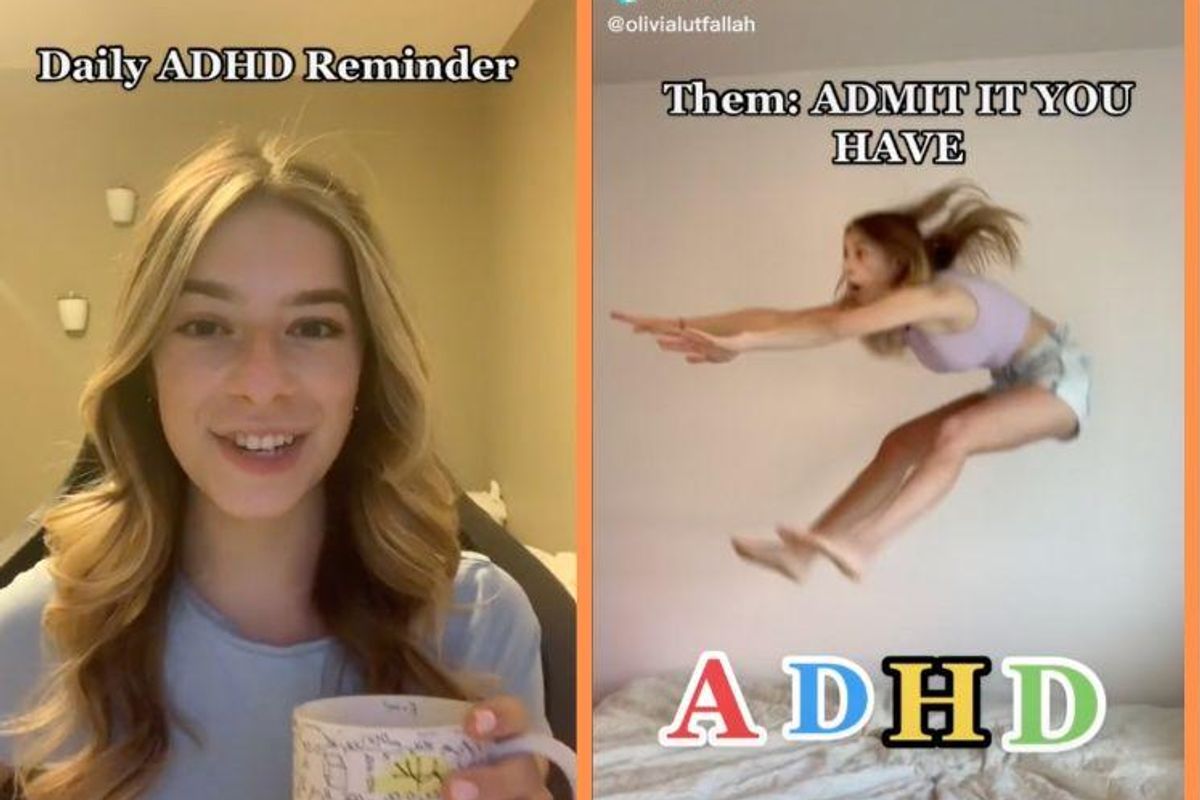College student uses adorable TikTok videos to shine a light on life with ADHD
Relatable for those who have it. Eye-opening for those who don't.

A little compassion goes a long way.
Creating TikToks might be the number one hobby of choice for many twenty-somethings. But for Olivia Lutfallah, it’s talking about ADHD. Actually, she’s combined both—offering videos that shine a light on the disorder in a fun, compassionate and educational way.
She took the decision to create an ADHD-specific TikTok right before the start exams in her second year of college, and originally it was for pure recreation. “I thought it would be fun to talk about ADHD. I mean, I've had like 20 years of coping experiences. It's something I absolutely love doing,” Lutfallah shared with Upworthy. That pastime has quickly grown into a deeper purpose.
Lutfallah, who was diagnosed with ADHD when she was around 7 years old, has dealt with a number of challenges with being misunderstood, especially when it came to getting necessary accommodations in school.She recalled having a physics teacher who wouldn’t allow her to get extra time to turn in work because she had the “highest grade in her class.” Having failed to see that ADHD affected Lutfallah’s “ability to go from the beginning of a task to the end of it” rather than her IQ, she thought she’d try to explain it another way. The next day she arrived in class with a note that read “ADHD stands for attention deficit hyperactive disorder.”
“And she said, ‘well, I'm a teacher. I took these courses. I know what that stands for'. And I said, ‘I know you think you know what that stands for, but I don't think you know what it means,'” Lutfallah shared. That statement finally clicked with the teacher, who apologized and told her, “Thank you for educating me. So I don't make that mistake again.”
With the intent to educate even more people, as well as empower others with ADHD to use their voice, Lutfallah has filled her channel with entertaining yet informative videos that offer one of three things—tips for dealing with ADHD, simple insights into the disorder and lighthearted, relatable ADHD content.
Here’s a small sampling:
@olivialutfallah I’ve shown up to the lab far too many times without goggles🫠 #fyp #fypシ #foryoupage #adhd #adhdtiktok ♬ original sound - Olivia Lutfallah
@olivialutfallah ADHD🤝Autism #fyp #fypシ #foryoupage #adhd #adhdtiktok #autism #autismoftiktok ♬ original sound - Olivia Lutfallah
@olivialutfallah I know im not the only one … #fyp #fypシ #foryoupage #adhd #adhdtiktok ♬ original sound - Olivia Lutfallah
Some of her most popular clips are the ADHD simulators, where viewers get to really witness how those with ADHD experience the world. To put it simply—it’s a lot of noise to deal with.
Below is an example of just how many distractions can pop up within only one minute of trying to make lunch. It paints such a clear picture of the difficulties those with ADHD face when trying to focus on everyday tasks.
@olivialutfallah This is just 1 minute of what I experience everyday as a person with adhd. #fyp #fypシ #foryoupage #adhd #adhdtiktok ♬ original sound - Olivia Lutfallah
“By the end of it, I had watered the flowers, not put away all the groceries, didn't eat and left to go and get ready for a meeting, you know? Just because there's so many different things going on," she shared.
Lutfallah bridges the gap between folks who are neurotypical and those who are neurodivergent in such fun ways that it’s no surprise her channel already has more than 200,000 followers. It’s clear from the comments that it is really serving a need. Attention-deficit/hyperactivity disorder can be a difficult thing to explain or understand. Symptoms can be quite general—such as lack of focus or impulsivity—and indicative of other conditions, often leading to misdiagnosis.
And even with a proper diagnosis, there is still a lot of stigma surrounding the condition, primarily due to misinformation. People might be labeled as bad students or workers, being mentally defective or perhaps worst of all, as having an imaginary condition that’s completely made up.“It's overwhelming and suffocating to understand what you're feeling, but not be able to express it to others,” Lutfallah explained. That’s why her ultimate goal is to inspire “a little compassion.”
You can find even more videos on Lutfallah’s TikTok.- A tiktokker went viral for posting what it's like having adhd. - Upworthy ›
- A viral TikTok video explains why interrupting others isn't always as ... ›
- Therapist with ADHD shares how she learned to clean - Upworthy ›
- Doctor breaks down how to recognize ADHD in adults - Upworthy ›
- There's an ADHD anthem that's beyond relatable - Upworthy ›

